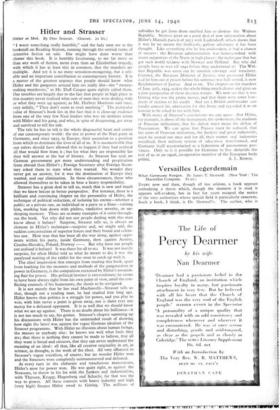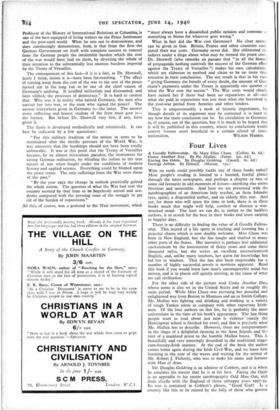Versailles Legerdemain
EVERY now and then, though all too seldom, a book appears embodying a thesis which, though the moment it is read it appears self-evident, has in fact for years escaped the notice of the very authorities whose special field it particularly concerns. Such a book, I think, is Dr. Shotwell's. The author, who is Professor of the History of International Relations at Columbia, is one of the best-equipped of living writers on the Peace Settlement and the post-1918 world. What he sets out to demonstrate, and does convincingly demonstrate, here, is that from the first the German Government set itself with complete success to conceal from the German people the intolerable burden which the cost of the war would have laid on them, by diverting the whole of their attention to the substantially less onerous burdens imposed by the Treaty of Versailles.
The consequences of this fact—if it is a fact, as Dr. Shotwell, justly I think, insists it is—have been far-reaching. " The effect of turning away from the cost of the war to the cost of the peace turned out in the long run to be one of the chief causes of Germany's undoing. It justified militarism and discounted, and later vilified, the processes of democracy." It is hard to contest that. Who was it in reality who ruined Germany, the men who carried her into war, or the men who signed the peace? The answer everywhere given in Germany is—the latter. The answer every reflecting and honest student of the facts must give is— the former. But before Dr. Shotwell very few, if any, have given it.
The thesis is developed methodically and relentlessly. It can best be indicated by a few quotations: " For this military tradition of the nation in arms to be maintained after the terrific pressure of the World War, it was necessary that the hardships should not have been totally unbearable. It was at this point that the Treaty of Versailles became, by an almost miraculous paradox, the instrument for saving German militarism, by blinding the nation to the true nature of war when fought under the conditions of modern history and applied science. Everything could be blamed upon the peace terms. The only sufferings from the War were those of the past."
" By the year 1922 the change in outlook practically gained the whole nation. The question of what the War had cost the country seemed by that time to be hopelessly unreal and aca- demic compared with the pressing issue of the struggle to get rid of the burden of reparations."
All this, of course, was a godsend to the Nazi movement, which " must always have a dissatisfied- public opinion and someone something to blame for whatever goes wrong." • What in fact did the War cost Germany? No clear answe - can be given to that. Britain, France and other countries com-
puted their war costs. Germany never did. She obliterated the subject under a dirge about what may be termed the peace cost,. Dr. Shotwell (who remarks en passant that " in all the histor.. of propaganda nothing outrivals the success of the German effort against the Treaty of Versailles ") makes his own calculation,
which are elaborate in method and claim to be no more tha.) tentative in their conclusions. The net result is that in his vies, " giving Germany the benefit of every doubt, the amount of Ger- many's payments under the Treaty is apparently one quarter of what the War cost the nation." The War costs would clearly have ruined her if there had been no reparations at all—and what she paid in reparations was less than what she borrowed in the post-war period from America and other lenders.
This is unquestionably a book of historic importance, for though details of its argument may be contested it is hard to see how the main conclusion can be. Its circulation in Germany is, of course, out of the question, but it is much to be hoped that it will be published in this country, where its conclusions would convey lessons most beneficial to a certain school of inter-































 Previous page
Previous page